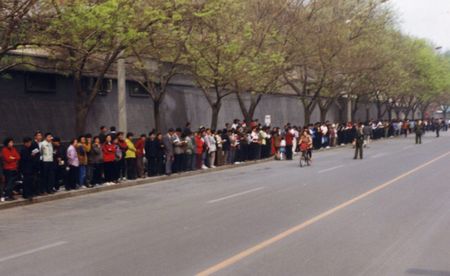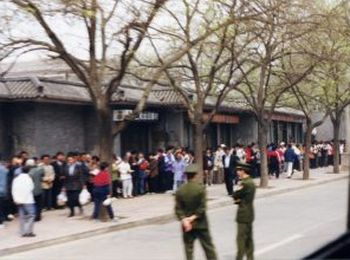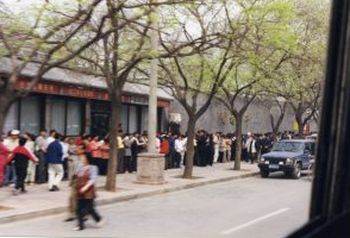(Minghui.org) In response to the strict pandemic lockdown in China, many people have taken the unprecedented step of protesting to defend their basic right to live a normal life. People clearly understand the underlying causes of these protests, as almost every Chinese has experienced the lockdown themselves and knows how it feels.
However, 24 years ago, before smartphones and the Internet became as prevalent as they are today, the truth about 10,000 Falun Gong practitioners who peacefully protested outside of the central government compound in Beijing on April 25, 1999, wasn’t so well understood.
As a result of Chinese Communist Party (CCP) information censorship and propaganda, many people in China still have the misconception that it was that unprecedented appeal that motivated the government to persecute Falun Gong. They never learned and still don’t know the real reason why so many practitioners went to Beijing.
In April 1999, He Zuoxiu, a scientist who was also the brother-in-law of Luo Gan, the general secretary of the Political and Legal Affairs Committee, published an article in Youth Science and Technology magazine titled “I Do Not Approve of Youths Practicing Falun Gong.” In the article, he repeated slanderous statements he’d made in 1998 on a Beijing Television Station program.
Disappointed at how the article slandered just a beneficial mind-body cultivation practice, Falun Gong practitioners in Tianjin went to the journal’s headquarters between April 18 and 24 to try to clarify the misunderstandings, only to be arrested. When other practitioners demanded their release, they were told that the arrest order came from Beijing and that the Police Ministry was involved. The Tianjin police advised the practitioners to go to Beijing to resolve the issue, which eventually prompted the practitioners to travel to Beijing the next day to seek justice for Falun Gong.
In fact, from 1996 to 1999, years before the incident in Tianjin, the then-head of the CCP, Jiang Zemin, assisted by Luo Gan and Zeng Qinghong, had already orchestrated several covert operations and attacks to defame and discredit Falun Gong. The appeal on April 25, 1999, wasn’t only to seek the release the practitioners in Tianjin but also to ensure a peaceful environment for Falun Gong practitioners to practice their faith.
When the practitioners arrived in Beijing from nearby cities and counties on April 25, the police directed them to line up around the central government compound. Later they accused the practitioners of “besieging the government” and used that as an excuse to initiate the persecution in July 1999. So the appeal was never the cause of the persecution, but an event manipulated by the regime to justify the persecution.

Then why were people in China so quick to believe the communist regime’s story about the “April 25 Appeal?”
I think there are three main reasons:
First, back then in the 1990s after half a century of communist rule, appeals and demonstrations were considered to be outright disobedience and a challenge to the CCP government. People simply weren’t open to the concept of appealing and thought it was a crime.
Second, the sheer number of practitioners who appealed that day was intimidating and thus easily portrayed as a “siege.” Given that there were an estimated 70-100 million people practicing Falun Gong at that time, the 10,000 or so participants would only account for 0.01% of the total, yet that was still a “threat” or “siege” in the eyes of the CCP.
Third, Falun Gong practitioners had held back when the CCP first began to discredit and disturb them in 1996 and silently tolerated what was going on. The CCP was good at eradicating any opposing voices and people it did not like. Falun Gong teaches forbearance, so the practitioners held back silently, hoping that time would speak to their innocence. However, Jiang Zemin viewed the practitioners’ self-control and tolerance with contempt and made it his goal to eradicate Falun Gong.

Defamation Campaign
Falun Gong, also known as Falun Dafa, was introduced to the public in May 1992. The miraculous health benefits and the principles of Truthfulness-Compassion-Forbearance drew a large number of people. By the time the persecution began in 1999, the Party estimated the number of practitioners to be between 70 to 100 million.
Such popularity was quickly noticed by the communist regime, which began to investigate the group as early as in 1994. Results of their investigations, including reports from undercover agents, indicated that Falun Gong was simply a meditation group that values the improvement of physical health and moral values. Although it failed to identify anything negative, the Party did not give up.
Before the publication of the defamatory article that led to the arrests of the practitioners in Tianjin in 1999, the CCP organised several campaigns to attack Falun Gong.
Guangming Daily was the first to publish an opinion article slandering Falun Gong on June 17, 1996.
On July 24, 1996, the Chinese Press and Publication Administration issued an internal document to all publication bureaus nationwide, prohibiting the publication and distribution of Falun Gong books, including Zhuan Falun and Falun Gong.
The Ministry of Public Security investigated Falun Gong nationwide in January and July 1997 and attempted to designate it as a cult. They not only failed to collect any evidence to support the claim, but many officers who participated in the investigation took up Falun Gong themselves.
In July 1998, the Ministry of Public Security, led by Luo Gan, declared Falun Gong a cult, before organising a nationwide campaign to collect evidence.
On July 21, 1998, the First Bureau of the Ministry of Public Security ordered the police in Xinjiang, Heilongjiang, Hebei, and Fujian Provinces to disperse Falun Gong practitioners who were doing the exercises together in the parks, raid their homes, and confiscate their possessions.
While many Chinese believed the CCP’s demonising propaganda and misunderstood Falun Gong back then, many have changed their minds thanks to practitioners’ persistent efforts to raise awareness over the past 24 years. Many have also come to realise the true nature of the CCP after having experienced the suppression themselves.
When all of the CCP’s crimes are finally brought to light, its ultimate collapse won’t be far behind. Only then can the nation’s people embrace freedom and peace, which have eluded them for too long.
More details about the April 25 Appeal can be read at: “From 1996 to 1999: A Holistic View of the April 25 Appeal in Beijing 22 Years Ago.”
Chinese version available
(Clearwisdom)

